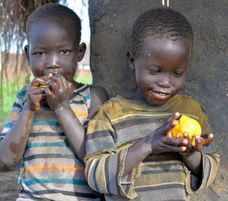
Thought the cost of groceries in Australia had climbed during COVID?
Well, we still are the 'lucky country', compared to places like Syria, east Africa or Myanmar, where the cost of food has soared by more than 50 per cent since the pandemic began.
That's the finding of a new World Vision report which has found food prices have not only hit a 10-year high during COVID, but that the biggest rises are hitting the world's poorest the hardest.
World Vision's Price Shocks report compared the cost of a basket of 10 staple items in 31 countries and found Australians would have to work an average of one hour to pay for the 10 items, while people in Syria would have to work three days and in South Sudan eight days.
While the cost of bananas, for example, had barely moved in Australia in 18 months, in Afghanistan it now accounts for 19 per cent of an average daily wage, in South Sudan 58 per cent and Chad 61 per cent – all countries where hundreds of thousands are going hungry.
While average food prices rose just 3.5 per cent in Australia over the 18 months of the pandemic, prices for the same items shot up in poor countries where food accounts for a larger share of household budgets.
Price Shocks found between February 2020 and July 2021, while Australian food prices rose by just 3.5 per cent, prices increased in Myanmar by 54 per cent, Lebanon 48 per cent, Mozambique 38.3 per cent, Vanuatu 30.9 per cent, Syria 29.2 per cent and Timor-Leste 17.7 per cent – affecting mainly people who could least afford it. Higher prices and lower incomes since COVID-19 have put healthy food beyond the reach of around three billion people.
Price Shocks found since the pandemic was declared, soaring food prices combined with lockdown-induced job losses and disrupted nutrition services had fuelled a global hunger crisis, with more people now dying each day from hunger than from COVID-19 itself.
World Vision Australia CEO Daniel Wordsworth said the report confirmed the aftershocks of COVID-19 had the potential to exact a greater toll on the world than the virus itself.
"Job losses and lower incomes from the pandemic are forcing millions of families to skip meals, go for cheaper, less nutritious food, or go without food altogether," Daniel said.
The report also cites a recent study which estimated by the end of 2022, the nutrition crisis caused by COVID-19 could result in 283,000 more deaths of children aged under five, 13.6 million more children suffering from wasting or acute malnutrition and 2.6 million more children suffering from stunting. This would equate to 250 children dying each day from pandemic-related malnutrition.
"As always, children suffer the most – they are the most vulnerable to hunger because they have a greater need for nutrients, they become undernourished faster than adults and are at a much higher risk of dying from starvation," Daniel said.
"And this is not only about hunger or malnutrition – it's also about how families cope, how they resort to desperate measures such as child marriage and child labour to put food on the table. It's a recipe for disaster."
Research in the Price Shocks report also found around 161 million more people went hungry in 2020 compared with 2019 – a 25 per cent increase. Most worryingly, more than 41 million people are suffering emergency levels of food insecurity and/or famine-like conditions across Africa and the Middle East.
Daniel said World Vision had been responding to the hunger crisis, reaching 12 million of the world's most vulnerable people in 29 countries with food and nutrition in 2020 alone.
And he was confident Australians would step up to help organisations like World Vision provide emergency food and cash assistance to those in need. World Vision has also urged the Australian Government to commit $AU150 million famine-prevention package to avert a worsening of the crisis.
"Generosity in the face of need is in our DNA, so I am certain Australians will respond – the same way we responded to the Boxing Day tsunami, the Ethiopia famine and the Beirut port explosion.
"Together, we can prevent the worst of this hunger crisis. But we can't do this alone. That's why we're asking the Australian Government to join with us and fund this famine-prevention package, because there's no place for famine in the 21st century."
The report can be found here.






